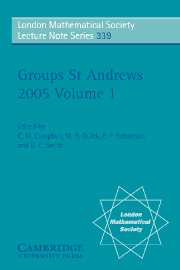Book contents
- Frontmatter
- Contents
- Introduction
- Aspects of infinite permutation groups
- Self-similarity and branching in group theory
- On surface groups: motivating examples in combinatorial group theory
- Nilpotent p-algebras and factorized p-groups
- Classification of finite groups by the number of element centralizers
- Algorithmic use of the Mal'cev correspondence
- Minimal but inefficient presentations for semi-direct products of finite cyclic monoids
- The modular isomorphism problem for finite p-groups with a cyclic subgroup of index p2
- On one-generated formations
- New results on products of finite groups
- Radical locally finite T-groups
- Explicit tilting complexes for the Broué conjecture on 3-blocks
- Conjugacy classes of p-regular elements in p-solvable groups
- An algorithm for the unit group of the Burnside ring of a finite group
- Integral group ring of the first Mathieu simple group
- Embedding properties in direct products
- Malcev presentations for subsemigroups of groups — a survey
- Finite groups with extremal conditions on sizes of conjugacy classes and on degrees of irreducible characters
- Conjugacy class structure in simple algebraic groups
- On automorphisms of products of groups
- Linear groups with infinite central dimension
- G-automata, counter languages and the Chomsky hierarchy
- An embedding theorem for groups universally equivalent to free nilpotent groups
- Irreducible word problems in groups
- Recent growth results
New results on products of finite groups
Published online by Cambridge University Press: 07 May 2010
- Frontmatter
- Contents
- Introduction
- Aspects of infinite permutation groups
- Self-similarity and branching in group theory
- On surface groups: motivating examples in combinatorial group theory
- Nilpotent p-algebras and factorized p-groups
- Classification of finite groups by the number of element centralizers
- Algorithmic use of the Mal'cev correspondence
- Minimal but inefficient presentations for semi-direct products of finite cyclic monoids
- The modular isomorphism problem for finite p-groups with a cyclic subgroup of index p2
- On one-generated formations
- New results on products of finite groups
- Radical locally finite T-groups
- Explicit tilting complexes for the Broué conjecture on 3-blocks
- Conjugacy classes of p-regular elements in p-solvable groups
- An algorithm for the unit group of the Burnside ring of a finite group
- Integral group ring of the first Mathieu simple group
- Embedding properties in direct products
- Malcev presentations for subsemigroups of groups — a survey
- Finite groups with extremal conditions on sizes of conjugacy classes and on degrees of irreducible characters
- Conjugacy class structure in simple algebraic groups
- On automorphisms of products of groups
- Linear groups with infinite central dimension
- G-automata, counter languages and the Chomsky hierarchy
- An embedding theorem for groups universally equivalent to free nilpotent groups
- Irreducible word problems in groups
- Recent growth results
Summary
The study of factorized groups has played an important role in the theory of groups. We can consider so relevant results as the Ito's Theorem about products of abelian groups or the celebrated Theorem of Kegel-Wielandt about the solubility of a product of two nilpotent groups. In the very much special case when the factors are normal and nilpotent, a well-known result due to Fitting shows that the product is nilpotent. Nevertheless it is not true in general that the product of two normal supersoluble subgroups of a group is a supersoluble group. To create intermediate situations it is usual to consider products of groups whose factors satisfy certain relations of permutability. Following Carocca [12] we say that a group G = AB is the mutually permutable product of A and B if A permutes with every subgroup of B and vice versa. If, in addition, every subgroup of A permutes with every subgroup of B, we say that the group G is a totally permutable product of A and B.
In this context, we can consider as seminal the following results of Asaad and Shaalan.
Theorem A (Asaad and Shaalan [2]) (i) Assume that a group G = AB is the mutually permutable product of A and B. Suppose that A and B are supersoluble and that either A, B or G', the derived subgroup of G, is nilpotent. Then G is supersoluble.
[…]
- Type
- Chapter
- Information
- Groups St Andrews 2005 , pp. 199 - 202Publisher: Cambridge University PressPrint publication year: 2007

